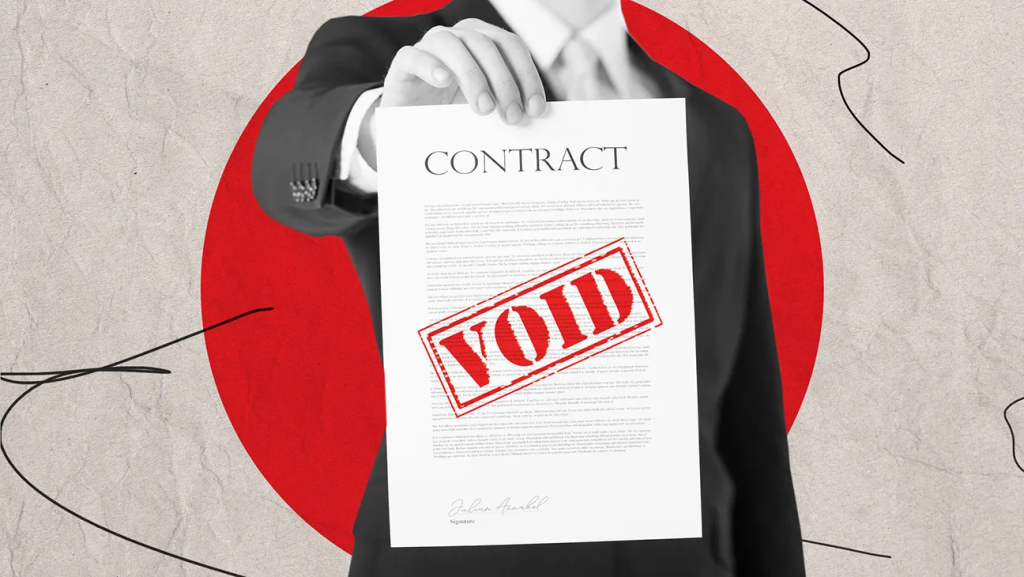Contracts are an essential part of civil transactions, defining the rights and obligations of the parties involved. However, not all contracts are legally valid. According to Vietnamese civil law, a contract may be invalid if it is falsified. This means the contract does not reflect the true intentions of the parties but is instead created to conceal another agreement or to avoid legal obligations.
Falsified contracts are quite common in practice and can cause legal disputes. Many people may not fully understand when a contract is considered falsified and what the consequences are. This article explains the concept of falsified contracts under Vietnamese law, their legal consequences, and some common situations where they arise. By understanding these issues, businesses and individuals can better protect their rights and avoid legal risks.

Invalid civil transactions (or contracts) due to falsification was mentioned in Article 124 of the Vietnam Civil Code, according to which:
1. Where parties enter into a civil transaction falsely for the purpose of concealing another civil transaction, such false transaction shall be invalid; notwithstanding, the transaction which is concealed shall be valid, unless it is also invalid pursuant to provisions of this Code or other relevant laws.
2. Where a civil transaction is falsely entered into for the purpose of evading responsibilities to a third person, such civil transaction shall be invalid.
According to Article 124, a falsified contract falls into two categories: one that is created to conceal another contract and one that is created to evade obligations to a third party. In these cases, the parties agree to establish a contract, but in reality, it is merely a facade. The true purpose is either to conceal another contract that they actually intend to perform or to avoid fulfilling an obligation to a third party. As a result, such a falsified contract does not reflect the parties’ true intentions.
This means that the parties involved do not want the third party to know the real nature of the transaction expressed in the falsified contract. Their goal may be to evade obligations or to conceal certain terms that would put them at a disadvantage if officially stated in a valid contract.
According to Clause 1, Article 124, a falsified contract shall be declared invalid. However, the concealed contract remains valid if it meets all the conditions specified in Article 117 of the 2015 Civil Code and does not fall into any other category of invalid contracts.
An example for a falsified contract would be: A company facing a legal claim from creditors may transfer assets to another company through a purchase agreement at an artificially low price to avoid asset seizure. Here, the contract is not a genuine business transaction but a means to evade financial obligations. Such a contract would be declared invalid under Article 124, potentially leading to legal consequences, including asset recovery by creditors.
When a contract is declared invalid, it is treated as if it never existed. The parties must return any exchanged assets or payments, or compensate if restoration is impossible. Businesses may face financial losses, operational disruptions, and potential legal penalties, especially if the contract was used to evade obligations. Invalid contracts can also affect third parties and damage a company’s reputation, making compliance essential to avoid costly risks.
It is important to ensure that a contract should align with the actual intent of the parties involved. If a company signs a contract that differs from its real business purpose—whether to manipulate taxes, conceal ownership, or avoid liabilities—it risks having the contract declared invalid.
To avoid the risk of signing a falsified contract, whether intentionally or unintentionally, businesses should strengthen their internal controls and compliance processes. This means regularly reviewing key contracts to identify potential legal issues, training employees on contract rules and risk management, and thoroughly verifying all agreements before signing to ensure they are valid and legally enforceable. By taking these steps, businesses can minimize legal risks and protect their interests in commercial transactions.
—————————————————-
CONTACT LEGAL CONSULTANT:
TLA Law is a leading law firm with a team of highly experienced lawyers specializing in criminal, civil, corporate, marriage and family law, and more. We are committed to providing comprehensive legal support and answering all your legal questions. If you have any further questions, please do not hesitate to contact us.
1. Lawyer Vu Thi Phuong Thanh, Manager of TLA Law LLC, Ha Noi Bar Association
Email: vtpthanh@tlalaw.vn
2. Lawyer Tran My Le, Chairman of the Members’ Council, Ha Noi Bar Association
Email: tmle@tlalaw.vn.

